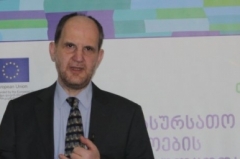News
Research on food security and Nutrition in Greater and Lesser Caucasus Range in Georgia

On March 25 at hotel Ambassador at 10:00 Oxfam Georgia and Rural and Agricultural Policy and Development Institute (RAPDI) kindly invite members of the press and media to the presentation of the research findings of the first national wide research on food security and nutrition in Greater and Minor Caucasus Rindge in Georgia The research findings showcase current challenges and opportunities that people living in the mountainous regions are facing, with the special emphasis on the villages across borderlines of Georgia
The presentation will be attended by the high officials from the Ministry of Agriculture and other governmental structures, as well as members of the civil society and international organisations who are contributing to tackling food security and nutrition challenges in highlands of Georgia
The study was carried out by the Rural and Agricultural Policy and Development Institute (RAPDI) within the framework of the EU-funded project “Improving Regional Food Security through National Strategies and Small Holder production in the South Caucasus” implemented by Oxfam in Georgia and Armenia. The objective of the research was to explore the current situation regarding Food Security and Nutrition in the high mountainous regions of Georgia and to evaluate climate change risks regarding food production and food accessibility. Also, the key component of the study was to identify the gender dynamics in food production and consumption practices.
The research study covered 3 regions of Georgia bordering the Russian Federation, Turkey, Armenia and Azerbaijan. Special emphasis were put on the villages located on the west of the Greater Caucasus range – Mestia and Oni Municipality; on the eastside villages of the Greater Caucasus range – Kazbegi, Dusheti and Akhmeta municipalities and the villages located in lesser Caucasus mountains – Aspindza, Adigeni, Akhalkalaki, Dmanisi, Khulo, Qeda and Shuakhevi.
Background:
In September 2013, Oxfam launched a 4-year EC-funded project titled Improving Regional Food Security through National Strategies and Small Holder Production in the South Caucasus. Central to the Project is the publication of gender sensitive food security and nutrition strategies in the three countries of the South Caucasus. The implementation of these strategies will lead to changes in attitudes on food security and nutrition, agricultural production practices and ultimately marketing due to an increased demand for healthy and locally produced food.




